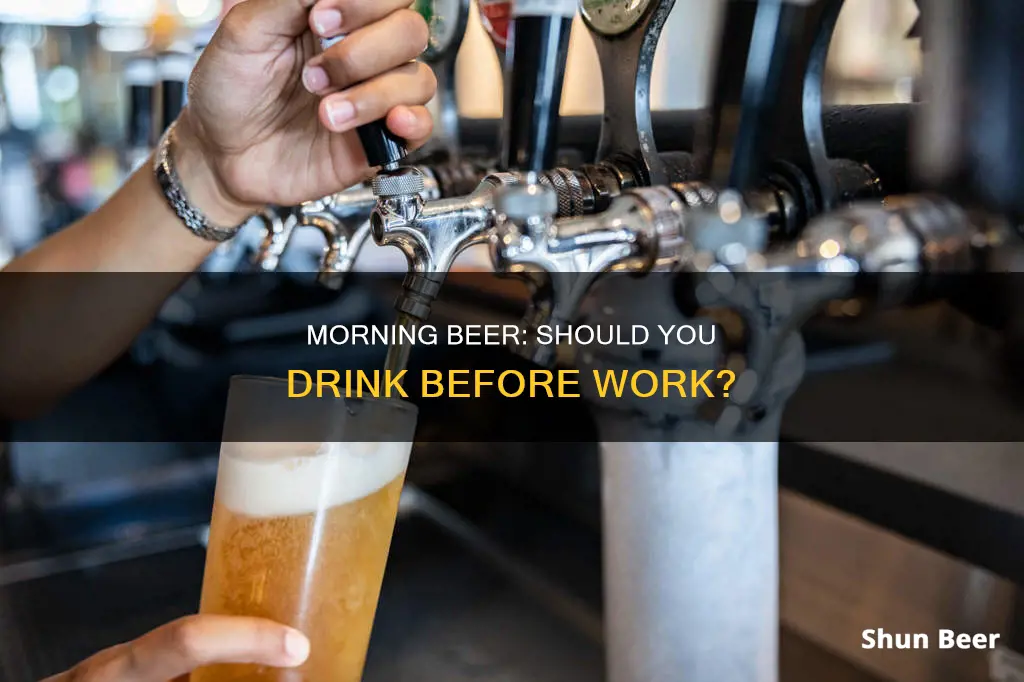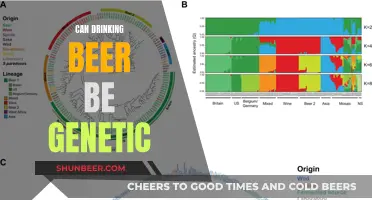
Drinking alcohol before work is generally not considered normal and can indicate alcohol abuse, especially if done regularly. It can be a sign of self-medicating to alleviate withdrawal symptoms or stress and anxiety at work. While some people may be able to consume a small amount of alcohol before work without noticeable negative effects, it can increase the risk of accidents, especially for those operating machinery or performing tasks requiring focus and control. It is important to prioritise safety and adhere to company policies and legal requirements regarding alcohol consumption, especially when working with patients or operating vehicles. Disciplinary actions, including termination, may be enforced if employees show up to work intoxicated or consume alcohol during their shift.
| Characteristics | Values |
|---|---|
| Normalised | No, most people don't consider drinking before work to be normal |
| Reasons | To soothe withdrawal symptoms, self-medicate anxiety or stress, increase confidence or creativity |
| Effects | Negative impact on productivity, health, and reputation |
| Dangers | Developing a physical or psychological dependence, higher risk of accidents, liver disease, dementia, and other physical complications |
What You'll Learn
- Drinking before work may indicate alcohol abuse, especially if it's a morning drink
- Drinking alcohol before work can negatively impact productivity and health
- Drinking at work can lead to inappropriate conduct, including sexual harassment
- Drinking at work may exclude some employees, such as those with addiction issues or religious beliefs prohibiting alcohol
- Drinking before work may lead to a higher risk of accidents, especially when operating machinery

Drinking before work may indicate alcohol abuse, especially if it's a morning drink
Drinking before work, especially in the morning, may be a sign of alcohol abuse or alcohol use disorder (AUD). Morning drinking is often referred to as "hair of the dog" and is sometimes used to soothe withdrawal symptoms after a night of heavy drinking. It can also be a way to self-medicate symptoms of anxiety or stress. While it may make you feel more confident or relaxed, drinking before work can negatively affect your productivity and health and increase the likelihood of drinking throughout the day.
Drinking alcohol before work can have various negative effects and pose dangers to your health and safety. It can lead to developing a physical and/or psychological dependence on alcohol and increase the risk of liver disease, dementia, and other physical complications. Drinking before work also increases the risk of accidents, especially when operating machinery or performing work that requires extreme focus and control.
If you suspect that you or someone you know may have a drinking problem, it is important to seek professional help. AUD can lead to long-term health consequences and impact your work performance and personal relationships. There are treatment options available, such as inpatient treatment, intensive outpatient care, and support groups like Alcoholics Anonymous (AA). Seeking help can help you live a happy, healthy, and alcohol-free life.
Additionally, drinking before work can have negative consequences for your career. While it is illegal to fire someone for being an alcoholic, as AUD is considered a disease, employers can still discipline or terminate employees for drinking on the job if it goes against company policies. Drinking before work can affect your productivity, reputation, and relationships with coworkers and supervisors. It can also lead to disciplinary actions or termination if it interferes with your ability to perform your job duties.
In conclusion, drinking before work, especially in the morning, may be a warning sign of alcohol abuse or AUD. It is important to recognize the negative effects of drinking before work and to seek help if needed. Treatment options are available, and seeking professional support can help you overcome a drinking problem and improve your overall well-being.
Beer and Metformin: What You Need to Know
You may want to see also

Drinking alcohol before work can negatively impact productivity and health
From an employer's perspective, alcohol use by employees can result in impaired performance, poor attendance, high turnover rates, and increased healthcare costs. Alcoholism in the workplace can also create a financial burden, with companies incurring costs related to absenteeism, health complications, injuries, and lost productivity.
Drinking before work can also have short- and long-term effects on employees, including sleeping while working, tardiness, poor decision-making, confrontational behaviour, and unintentional injuries. It is essential to recognise these warning signs and seek treatment for alcohol use disorders to mitigate the negative consequences on both the individual and the organisation.
Beer and Covid 19: What's Safe to Drink?
You may want to see also

Drinking at work can lead to inappropriate conduct, including sexual harassment
Drinking at work can have adverse effects on employees and the work environment. While some people might argue that drinking at work is a personal choice, it can often lead to inappropriate conduct, including sexual harassment.
Drinking alcohol at work can impair judgment and lower inhibitions, leading to socially inappropriate behaviour. This can include sexual harassment, which is a form of sex discrimination that occurs in the workplace. According to the United States Equal Employment Opportunity Commission, sexual harassment can encompass unwelcome sexual advances, requests for sexual favours, and other verbal or physical conduct of a sexual nature. Such behaviour can be deemed sexual harassment when submission to such conduct becomes a condition of an individual's employment or when it interferes with an individual's work performance, creating a intimidating or offensive working environment.
Research has shown a strong link between permissive workplace drinking cultures and sexual harassment. The consumption of alcohol can embolden individuals, leading to forward behaviour that often targets women in the workplace. Additionally, alcohol is associated with a significant proportion of sexual assaults, with estimates ranging from 40% to 75%. The effects of alcohol can also exacerbate pre-existing biases, leading to interactions that reinforce negative stereotypes or discriminatory beliefs.
Furthermore, drinking at work can create a culture of exclusion for employees who choose not to drink. This can be due to various reasons, such as avoiding drunk co-workers, maintaining their job performance, struggling with alcohol personally, or needing to drive home. As stated by Antonia Abbey, a professor of psychology at Wayne State University, drinking at work "sends the message that [co-workers] have to drink alcohol to fit into this work environment." This can put non-drinkers in an uncomfortable position and create a sense of pressure to conform to the drinking culture.
To promote a safe and inclusive work environment, it is essential to address the issue of drinking at work and its potential consequences, including inappropriate conduct and sexual harassment. By establishing clear policies and guidelines, organisations can encourage responsible drinking behaviours and ensure the well-being and comfort of all employees, regardless of their choice to consume alcohol or not.
Liver Biopsy: Drinking Beer, Safe or Not?
You may want to see also

Drinking at work may exclude some employees, such as those with addiction issues or religious beliefs prohibiting alcohol
Drinking at work may exclude some employees, such as those with addiction issues. For example, if an employee has a history of alcohol abuse, they may be triggered by the presence of alcohol in the workplace. This could create an unsafe work environment and negatively impact productivity.
Additionally, drinking at work may exclude some employees with religious beliefs prohibiting alcohol. For example, if an employee's religion prohibits the consumption of alcohol, they may feel excluded if their coworkers are drinking. This could create a hostile work environment and negatively impact productivity.
To promote an inclusive work environment, employers should be mindful of employees' diverse backgrounds and beliefs when making decisions about drinking at work.
Beer and Inflammation: Is There a Link?
You may want to see also

Drinking before work may lead to a higher risk of accidents, especially when operating machinery
Drinking before work can lead to a higher risk of accidents, especially when operating machinery. Alcohol is a central nervous system depressant that impairs balance, visual focus, reaction time, and judgment. Even low to moderate levels of alcohol can have these effects, and the risk of accidents increases sharply with higher levels of consumption.
Workplace factors that can increase the risk of alcohol use include the availability or access to alcohol, a lack of rules and regulations around alcohol use, and poor workplace relationships. Alcohol use can negatively affect productivity and health, and can increase the likelihood of developing an alcohol use disorder. It can also lead to issues with co-workers and supervisors and cause accidents that not only affect the person under the influence but their co-workers as well.
Employers can play a crucial role in reducing the risk of accidents related to alcohol use by establishing clear policies and offering staff wellbeing support and education. It is important to recognize the signs of alcohol abuse and to seek professional help if needed.
Beer and Cinarizina: A Safe Mix?
You may want to see also
Frequently asked questions
Drinking alcohol before work can be a sign of alcohol dependence, especially if you drink in the morning to soothe withdrawal symptoms from heavy drinking the night before. If you are drinking to self-medicate symptoms of anxiety or stress, it is a sign of alcoholism.
Drinking alcohol before work can negatively impact your productivity and health. It can increase the likelihood of drinking throughout the day, leading to accidents, especially when operating machinery or performing work that requires extreme focus and control. It can also lead to liver disease, dementia, and other physical complications.
Drinking alcohol can negatively influence your productivity and reputation at work. It can lead to issues with fulfilling responsibilities and cause problems with your co-workers and supervisors. However, some people argue that drinking in moderation can improve creative problem-solving abilities and help employees bond and connect.
Yes, you can get fired for drinking on the job or for actions influenced by alcohol. However, it is illegal to fire someone for being an alcoholic because alcohol use disorder (AUD) is considered a disease. While employers cannot excuse performance issues or misconduct caused by alcoholism, they should be ready to evaluate whether an effective accommodation can be made.







